(Bloomberg) -- Troubled companies behind on their bills or already in bankruptcy may be out of luck when it comes to getting federal funds from the U.S. stimulus package.
Current law blocks the government from making loans to companies that have either filed for Chapter 11 bankruptcy or fail an insolvency test, according to lawyers who’ve studied the new legislation. In that scenario, it would be nearly impossible for such borrowers to access financing from the Federal Reserve.
Some businesses angling for government relief “may discover a rude awakening” if those standards still apply to the new Coronavirus Aid, Relief and Economic Security Act, said Vincent Indelicato, a partner specializing in restructuring and bankruptcy law at Proskaur Rose. “This bill may not be the economic life preserver companies and their lenders were hoping for.”
Record Size
The size of the $2 trillion stimulus is unprecedented, surpassing the approximately $800 billion package that passed after the 2008 financial crash. The coronavirus plan provides about $500 billion in loans and assistance for big companies, provided they retain most of their employees and don’t buy back stock. Airlines are eligible for grants in exchange for giving the government equity stakes.
There is a separate pool of about $350 billion for small business loans, which won’t have to be paid back if used for staff compensation, mortgage interest and rent.
But the Federal Reserve doesn’t typically lend to insolvent borrowers -- those who have trouble meeting their financial obligations or paying down debt when it comes due. That’s to protect against situations where companies access taxpayer or government funds, only to file for bankruptcy and leave the government with mounting losses.
Hard Lesson
Restrictions were put in place in 2015 after some companies bailed out under previous rescue packages wound up stiffing the federal government. In 2009, for example, middle-market lender CIT Group Inc. filed bankruptcy less than a year after getting billions in federal aid, wiping out the preferred stock sold to the U.S. Treasury.
Under the Federal Reserve Act, insolvency is determined by an inability to pay debts within 90 days before accessing a federal loan. How companies fit into the legislation passed by the Senate and House of Representatives last week remains a subject of debate, with business managers left to wonder how or if they qualify for relief.
Requests for comment from the U.S. Treasury Department and Senate Majority Leader Mitch McConnell, the act’s sponsor, weren’t immediately returned.
“Companies in distress probably saw the $500 billion headline and imagined they caught the Hampton Jitney,” Indelicato said, referring to the shuttle service to New York’s tony beach retreats. “But they may have already missed the bus,” he said. “This is uncharted territory for everyone.”
If a company does get aid and files bankruptcy anyway, the federal loan would likely be treated the same as any other debt under Chapter 11 rules, said Amy Quackenboss, executive director of the American Bankruptcy Institute.
BDC Borrowers
Firms that borrowed from business development companies, a type of private credit lender, may be eligible for the relief, according to a recent report from Raymond James & Associates.
Some BDCs are actively examining how their portfolio companies can benefit from the stimulus package. In a recent note to shareholders, Bain Capital Specialty Finance Inc. Chief Executive Officer Michael Ewald said, “We are also actively pursuing opportunities for BCSF to benefit from the recently enacted CARES Act.”
But some companies backed by private equity firms may not be so lucky. They could find themselves shut out due to affiliation rules that would count the employees of the sponsor along with the borrower to see if they fall below a 500-worker threshold.
There are some 60,000 private equity-backed middle market companies in the U.S., according to the National Center for the Middle Market, the vast majority leaning on direct lenders for their financing needs.
Companies in the middle market that faced trouble before the virus outbreak are particularly vulnerable and will be the first to go bust, said Aram Ordubegian at restructuring law firm Arent Fox.
“A small jolt would have pushed them over,” Fox said. “Well, this is a big jolt.”
For companies pushed into bankruptcy by the coronavirus, the law does loosen some restrictions, according to an analysis by the law firm Foley & Lardner. The debt limit on small businesses seeking to use rules that make it easier for them to reorganize has been increased from $2.7 million to $7.5 million.
Bankrupt companies hit with financial troubles caused by the virus can also rewrite reorganization plans that have already been approved by a court. Both provisions expire after one year.
Consumers also got a break in the bill, which doesn’t allow any federal money they receive to count against them in bankruptcy when determining their income and ability to repay creditors, said the ABI’s Quackenboss.
“Consumers and small businesses will have greater access to the financial fresh start of bankruptcy,” she said in a statement.
©2020 Bloomberg L.P.

